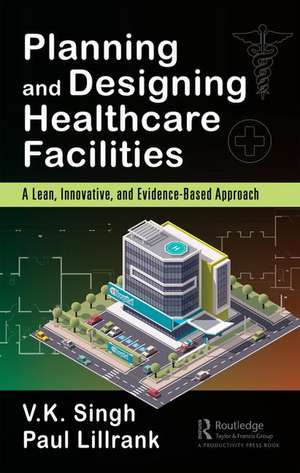Planning and Designing Healthcare Facilities: A Lean, Innovative, and Evidence-Based Approach
Editat de Vijai Kumar Singh, Paul Lillranken Limba Engleză Hardback – 31 oct 2017
Planning and Designing Healthcare Facilities: A Lean, Innovative, and Evidence-Based Approach explores recent developments in hospital design. Medical facilities have been adapted to the requirements of clinical functions. Recently, the needs of patients and clinical pathways have been recognized. With the patient at the center of the process, the flow of tasks becomes the guiding principle as hospital design must employ evidence-based thinking, and process management methods such as Lean become central.
The authors explain new concepts to reduce healthcare delivery cost, but keep quality the primary consideration. Concepts such as sustainability (i.e., Green Hospitals) and the use of new tools and technologies, such as information and communication technology (ICT), Lean, and evidence-based planning and innovations are fully explained.
Preț: 492.54 lei
Preț vechi: 579.46 lei
-15% Nou
Puncte Express: 739
Preț estimativ în valută:
94.28€ • 102.44$ • 79.24£
94.28€ • 102.44$ • 79.24£
Carte tipărită la comandă
Livrare economică 21 aprilie-05 mai
Preluare comenzi: 021 569.72.76
Specificații
ISBN-13: 9781138032262
ISBN-10: 1138032263
Pagini: 278
Ilustrații: 29 Line drawings, black and white; 49 Halftones, black and white; 5 Tables, black and white; 78 Illustrations, black and white
Dimensiuni: 156 x 234 x 18 mm
Greutate: 0.54 kg
Ediția:1
Editura: Taylor & Francis
Colecția Productivity Press
Locul publicării:Oxford, United Kingdom
ISBN-10: 1138032263
Pagini: 278
Ilustrații: 29 Line drawings, black and white; 49 Halftones, black and white; 5 Tables, black and white; 78 Illustrations, black and white
Dimensiuni: 156 x 234 x 18 mm
Greutate: 0.54 kg
Ediția:1
Editura: Taylor & Francis
Colecția Productivity Press
Locul publicării:Oxford, United Kingdom
Public țintă
Professional and Professional Practice & DevelopmentCuprins
Chapter 1: Introduction.
Chapter 2: Innovative, Lean, and Evidence-Based Design.
Chapter 3: Concept of a Hospital.
Chapter 4: Patient First, Functions Next, and Design Later.
Chapter 5: Green Hospitals and Sustainable Solution to Healthcare Facility.
Chapter 6: Designing a Patient-Centric Healthcare Facility Using Lean Methodology.
Chapter 7: Creating Safer Healthcare Environments Using an Evidenced-Based Design Process.
Chapter 8: Evidence-Based Design in Hospitals: Theory to Implementation.
Chapter 9: Virtual Hospitals of the Future.
Chapter 10: Redefining Healthcare of Tomorrow in Smart City.
Chapter 11 Delivering Inclusive Intelligent Healthcare by Innovative and Comprehensive e-Health System.
Chapter 12: Planning Safe Hospitals.
Chapter 13: Designing Innovative Facilities: Contamination and Security Hazards at Hospitals.
Chapter 14: Adapt or Obsolesce: The Evolution of Singapore Health System.
Summary.
Chapter 2: Innovative, Lean, and Evidence-Based Design.
Chapter 3: Concept of a Hospital.
Chapter 4: Patient First, Functions Next, and Design Later.
Chapter 5: Green Hospitals and Sustainable Solution to Healthcare Facility.
Chapter 6: Designing a Patient-Centric Healthcare Facility Using Lean Methodology.
Chapter 7: Creating Safer Healthcare Environments Using an Evidenced-Based Design Process.
Chapter 8: Evidence-Based Design in Hospitals: Theory to Implementation.
Chapter 9: Virtual Hospitals of the Future.
Chapter 10: Redefining Healthcare of Tomorrow in Smart City.
Chapter 11 Delivering Inclusive Intelligent Healthcare by Innovative and Comprehensive e-Health System.
Chapter 12: Planning Safe Hospitals.
Chapter 13: Designing Innovative Facilities: Contamination and Security Hazards at Hospitals.
Chapter 14: Adapt or Obsolesce: The Evolution of Singapore Health System.
Summary.
Notă biografică
Dr. Vijai K. Singh retired as Surgeon Rear Admiral after 37 years in national and international assignments. He earned MBBS, Masters in Hospital Administration, Diplomate National Board in Hospital and Health Care Management, and M Phil. He was awarded a Distinguished Services Medal for services in Zambia by the President of India and commendation by Zambia. He had been deputy chief medical officer of the United Nations, adjunct professor of the Massachusetts Institute of Technology (MIT), Zaragoza, Spain, and consultant to the National Disaster Management Authority. He was president of the Academy of Hospital Administration, founder director of the International Institute of Health Management Research, chairman of the Health Care Division of Quality Council of India, and member of the International Group on Biosafety. He developed a European Foundation for Quality Management (EFQM) model for Healthcare in India released by Union Health Minister.
Presently, he is Adjunct Research Professor at the International Health Innovation Center, Ivey School of Business, Canada, and Director of Healthcare Asia for Lean Healthcare Excellence-Simpler. He is a member of the National Public Health Committee of Confederation of Indian Industry (CII) and visiting professor of the Indian Institute of Management, Management Development Institute, and Public Health Foundation of India.
Paul Lillrank has been a professor of quality and service management at Aalto University since 1994. He earned his PhD from Helsinki University in 1988 after postgraduate studies in Japan, where he studied quality management in Japanese industry. He has worked at Science University of Tokyo, the Boston Consulting Group, and Stockholm School of Economics. He has pioneered industrial management applications in health care and cofounded the Institute of Healthcare Engineering, Management and Architecture (HEMA) at Aalto, Finland, and the Nordic Healthcare Group (NHG), a consultancy.
He has published in the areas of health-care operations management, technology transfer, service quality, and process analysis. He teaches regularly at the Indian Institute of Technology, Kharagpur.
Presently, he is Adjunct Research Professor at the International Health Innovation Center, Ivey School of Business, Canada, and Director of Healthcare Asia for Lean Healthcare Excellence-Simpler. He is a member of the National Public Health Committee of Confederation of Indian Industry (CII) and visiting professor of the Indian Institute of Management, Management Development Institute, and Public Health Foundation of India.
Paul Lillrank has been a professor of quality and service management at Aalto University since 1994. He earned his PhD from Helsinki University in 1988 after postgraduate studies in Japan, where he studied quality management in Japanese industry. He has worked at Science University of Tokyo, the Boston Consulting Group, and Stockholm School of Economics. He has pioneered industrial management applications in health care and cofounded the Institute of Healthcare Engineering, Management and Architecture (HEMA) at Aalto, Finland, and the Nordic Healthcare Group (NHG), a consultancy.
He has published in the areas of health-care operations management, technology transfer, service quality, and process analysis. He teaches regularly at the Indian Institute of Technology, Kharagpur.
Recenzii
"Supersonic speed developing health technologies are putting extra burden to the care infrastructure and environment. In one hand, the changing way to practice medicine dictates the need for contemporary innovations in planning and design of the physical infrastructure, but perhaps points even more importantly to the quest for dynamic and rapidly adjustable virtual groundwork to support efficient care.
Therefore, the current book edited by distinguished pundits in health care innovation Prof V.K. Singh and Prof Paul Lillrank, proves to be timely and needed. Without doubt this book will serve as a useful tool to the rapidly evolving health care systems in South and South-East Asia, in particular."
-Dr Jaanus Pikani, Chairman, ScanBalt, Denmark
"It is an established fact that well designed hospitals in terms of architecture, operational processes and protocols have a significant impact to patient health outcomes. One example is modelling processes based on Patient Flow Analysis (PaFA). Recent advances in Big Data solutions and Machine Learning have enabled evidence and data driven decision making that would guide innovations in the planning and design of healthcare facilities. There are significant opportunities for further enhancement of efficiency in healthcare operations. This book is timely in addressing those opportunities and provides guidance to the practitioner in the various approaches they might want to explore and pursue towards this noble goal of a better patient experience and outcome."
-Sandipan Gangopadhyay, President and COO, Galaxy Systems, USA
"This Book is a comprehensive one and covering planning, design and control of healthcare facilities which is a major aspect of cost of healthcare delivery. It has drawn various lessons on how management science and innovations can help in delivering quality care at low cost."
-S. Venkataramanaiah, PhD, Associate Professor in Operations Management, Indian Institute of Management, Lucknow, India
"This book is very much needed to catalyse the innovations and growth in health sector in developing nations. The spectrum of content and the background of contributors is very impressive. It will give readers the new and global insights to improve the existing healthcare conditions locally. The mix of basic ideas in the futuristic framework covers the whole continuum of putting together the best practices in planning and designing healthcare facilities across the world. The suggestions in the book can be looked upon by various stake holders of healthcare system in developing nations which could help them to jump over the current challenges and be at par (or better) with developed nations in Healthcare facilities."
-Saurabh Gupta, PhD, Assistant Professor, Department of Biomedical Engineering, National Institute of Technology, Raipur, India
"This book could not have been launched at a better moment. India is reeling under the pressure of providing more hospitals, which are also matching quality standards internationally, for its masses. I urge all players in the healthcare industry to study this book so that Indian hospitals can increase the service levels that have not been achieved so far."
-Brig (Hony) Dr Arvind Lal, Padma Shri, Chairman & Managing Director
Therefore, the current book edited by distinguished pundits in health care innovation Prof V.K. Singh and Prof Paul Lillrank, proves to be timely and needed. Without doubt this book will serve as a useful tool to the rapidly evolving health care systems in South and South-East Asia, in particular."
-Dr Jaanus Pikani, Chairman, ScanBalt, Denmark
"It is an established fact that well designed hospitals in terms of architecture, operational processes and protocols have a significant impact to patient health outcomes. One example is modelling processes based on Patient Flow Analysis (PaFA). Recent advances in Big Data solutions and Machine Learning have enabled evidence and data driven decision making that would guide innovations in the planning and design of healthcare facilities. There are significant opportunities for further enhancement of efficiency in healthcare operations. This book is timely in addressing those opportunities and provides guidance to the practitioner in the various approaches they might want to explore and pursue towards this noble goal of a better patient experience and outcome."
-Sandipan Gangopadhyay, President and COO, Galaxy Systems, USA
"This Book is a comprehensive one and covering planning, design and control of healthcare facilities which is a major aspect of cost of healthcare delivery. It has drawn various lessons on how management science and innovations can help in delivering quality care at low cost."
-S. Venkataramanaiah, PhD, Associate Professor in Operations Management, Indian Institute of Management, Lucknow, India
"This book is very much needed to catalyse the innovations and growth in health sector in developing nations. The spectrum of content and the background of contributors is very impressive. It will give readers the new and global insights to improve the existing healthcare conditions locally. The mix of basic ideas in the futuristic framework covers the whole continuum of putting together the best practices in planning and designing healthcare facilities across the world. The suggestions in the book can be looked upon by various stake holders of healthcare system in developing nations which could help them to jump over the current challenges and be at par (or better) with developed nations in Healthcare facilities."
-Saurabh Gupta, PhD, Assistant Professor, Department of Biomedical Engineering, National Institute of Technology, Raipur, India
"This book could not have been launched at a better moment. India is reeling under the pressure of providing more hospitals, which are also matching quality standards internationally, for its masses. I urge all players in the healthcare industry to study this book so that Indian hospitals can increase the service levels that have not been achieved so far."
-Brig (Hony) Dr Arvind Lal, Padma Shri, Chairman & Managing Director
Descriere
The book explains new concepts to reduce healthcare delivery cost yet keep quality. Concepts such as sustainability (i.e., Green Hospitals) and the use of new tools and technologies such as information and communication technology (ICT), Lean, and evidence-based planning and innovations are fully explained.














